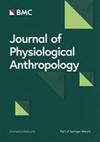Alleviation of acute stress response by black pepper aroma administration
IF 3.1
4区 医学
Q1 Social Sciences
引用次数: 0
Abstract
Black pepper is one of the most popular spices globally. As black pepper essential oil has not yet been used in the context of aromatherapy, this study examined the effect of black pepper aroma on cardiac and peripheral autonomic nervous system (ANS) activity under stressful conditions using an olfactometer to administer aroma in a precise and controlled manner to ensure reproducibility. A within-participant design experiment was conducted with 20 male university students who performed a 30-min calculation task as a short-term stressor under three aroma conditions: black pepper, ginger, and dipropylene glycol (DPG) (scentless air as a control). Each aroma was sporadically delivered (first 20 s of each 1-min interval) with the olfactometer during the task. Electrocardiograms and skin conductance level (SCL) were measured to evaluate ANS's physiological acute stress response. Subjective evaluations for the given stressful task and impressions on the types of aromas were assessed. The physiological acute stress response induced by the short-term stressor, which is characterized by the enhancement of the heart rate (HR) and SCL and decreases in the heart rate variability (HRV), was suppressed with black pepper: the increase in HR and reduction in HRV from the baseline were 38.9% (p = 0.048 when compared with DPG) and 32.9% smaller (p = 0.002 for multiple comparisons) than those in DPG, respectively, and the increase of SCL was 15.5% smaller (p = 0.005 for multiple comparisons) than that in ginger. However, there was no significant difference in subjective scores among the conditions. Although black pepper is a stimulative agent, the study findings showed that black pepper aroma alleviated the physiological acute stress response, which can be beneficial in aromatherapy under stressful conditions.施用黑胡椒香气缓解急性应激反应
黑胡椒是全球最受欢迎的香料之一。由于黑胡椒精油尚未被用于芳香疗法,本研究使用嗅觉仪以精确可控的方式施用香气,以确保可重复性,研究了黑胡椒香气对压力条件下心脏和外周自律神经系统(ANS)活动的影响。在黑胡椒、生姜和二甘醇(DPG)三种香气条件下(无香气空气作为对照),20 名男性大学生进行了 30 分钟的计算任务,以此作为短期压力源。在完成任务期间,每种香气都会通过嗅觉仪零星散发(每间隔 1 分钟的前 20 秒)。测量心电图和皮肤电导水平(SCL)以评估 ANS 的生理急性应激反应。还评估了对特定压力任务的主观评价以及对香气类型的印象。短期压力诱导的生理急性压力反应表现为心率(HR)和 SCL 的升高以及心率变异性(HRV)的降低,而黑胡椒则抑制了这种反应:与基线相比,心率的升高和心率变异性的降低分别为 38.9%(与 DPG 比较,p = 0.048)和 32.9%(多重比较,p = 0.002),SCL 的增加比生姜小 15.5%(多重比较,p = 0.005)。然而,不同条件下的主观评分没有明显差异。虽然黑胡椒是一种刺激性物质,但研究结果表明,黑胡椒香气能缓解生理上的急性应激反应,这在应激条件下的芳香疗法中是有益的。
本文章由计算机程序翻译,如有差异,请以英文原文为准。
求助全文
约1分钟内获得全文
求助全文
来源期刊

Journal of Physiological Anthropology
Social Sciences-Human Factors and Ergonomics
CiteScore
4.80
自引率
6.50%
发文量
39
审稿时长
>12 weeks
期刊介绍:
Journal of Physiological Anthropology (JPA) is an open access, peer-reviewed journal that publishes research on the physiological functions of modern mankind, with an emphasis on the physical and bio-cultural effects on human adaptability to the current environment.
The objective of JPA is to evaluate physiological adaptations to modern living environments, and to publish research from different scientific fields concerned with environmental impact on human life.
Topic areas include, but are not limited to:
environmental physiology
bio-cultural environment
living environment
epigenetic adaptation
development and growth
age and sex differences
nutrition and morphology
physical fitness and health
Journal of Physiological Anthropology is the official journal of the Japan Society of Physiological Anthropology.
 求助内容:
求助内容: 应助结果提醒方式:
应助结果提醒方式:


